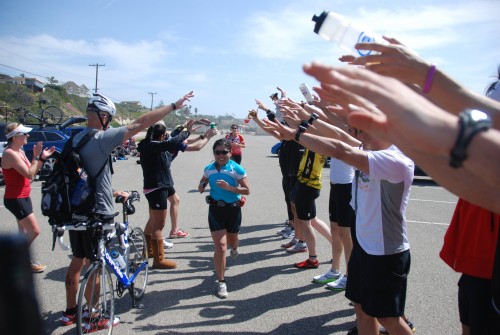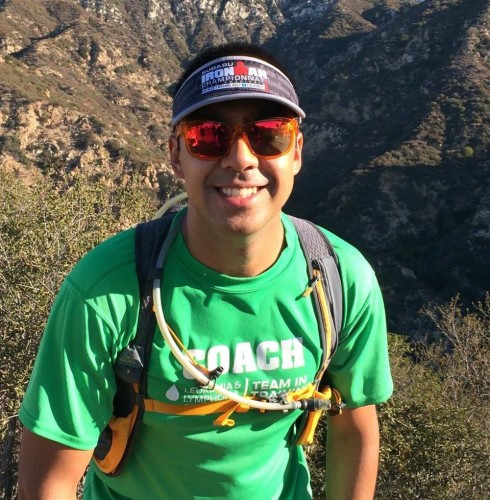
Let’s be honest, being on IronTEAM wasn’t easy. If it were though, everybody would be doing it. Last week we announced the team’s official races for the 2012 season. Hawaii 70.3, Vineman Full, and Ironman Canada, and since then many of the alumni have had interest in coming back, as well as many new possible participants. There’s this mystique about the team if you’re an outsider – people call us crazy, people don’t know how we do it, people think it’s something they never can do. Well, everyone’s experience is different, but if this thing was bad for you, or so impossible to do, then why would so many people come back, or why does this team have such a high retention rate, or why are people so passionate about it trying to recruit more friends & family to share this experience?
You’ve probably read my Vineman Race Report, and that explained the full experience of the very last day of my IronTEAM training season, but most people don’t know the rest of the story, my thoughts, my journey leading up to it.
WHY?
The actual decision to join the team came about 5 months prior. It was at the Seattle Marathon finish where things felt empty. It was then I felt like I needed a new challenge. I had all the reasons NOT to join the team because I didn’t know how to swim, neither did I own a bike, but from previous TNT experience, I knew the coaches will get you there. I was first set on doing a half Ironman at first, which would have been 6 months of training. The full practiced for 9 months. I figured, well, if I’m going to commit to 6 months, I’d rather just tough it out for 3 more and do 9 and dive down the deep end. Better to do 9 now, than do 6, like it, then do another 9 next year for 15 total? Let’s go big or go home!
Also, I figured, what’s 9 months? Grad school would take more time, coming back season after season as mentor on the marathon team is just as time consuming, and I didn’t mind sacrificing the parties or drinking nights out anyway. Change was needed, and this sounded so interesting & exciting to be learning so many things. Trust me, I was scared because this was ALL new territory. I’ve never done a mini or sprint triathlon to start, neither did I ever spectate one. I’ve seen the Kona Championships on TV, but that was a whole other level beyond my knowledge at the time. I felt I needed to get faster on my run, or even have some base of swimming or cycling, but after thinking about it a lot (I mean, A LOT), just like when I trained for my first marathon, I realized that’s why we train, to get to that goal. Just like school – are you ever prepared on that first day? Do you expect to graduate the following day? No, it takes preparation, great leadership & mentors to get you there. This was definitely one of those where if you put the work in, you will reap the rewards in the end. You just have to decide you want it, trust in the program, then everything will come together eventually.
THE MONEY FACTOR
This sport is definitely expensive. I thought marathons were expensive. Now take that x3 for each sport! That was a big concern for me, as well as many people wanting to do this. Actually, the biggest roadblock for most. The bike part will be your biggest investment, and all the accessories that comes with it. Let’s not forget all the food you will be consuming during training and the day to day! I got lucky and took on a freelance project months prior that pretty much paid for my bike ($1200) and all the initial goodies (another $300), but the team has loaner bikes for you until you’ve saved up enough. All the other stuff, I somehow made things work to afford everything – I ate out less, I traveled less, I drank less. All that kinda offset all the tri expenses. During holiday season (also around the time for my birthday), I asked for Tri-bags, compression socks (can’t believe I asked for SOCKS for Christmas), sports store gift cards. Amazon was also a good resource because of no tax & free shipping promos.
SOCIAL LIFE
Oh, if it’s not the money factor, it’s the social life (or lack of it) that people are scared of. It was easier for me compared to some other people on the team because I’m single, no kids, and a relatively easy work schedule. The biggest change for me was sacrificing all the partying I did. Went out pretty often, Monday, Tuesday, Thursday, all weekend, didn’t matter. If there was an event, and I wasn’t doing anything, I went. That in itself is pretty expensive. So deciding to join the team was probably a godsend because it saved my liver, and actually saved more money in the long run. I actually still went out quite often in the beginning of the season. So much that I didn’t want to add the coaches on Facebook because they’d see how much I’d be going out the night before practice. Had one crazy New Year’s Eve celebrating, went to a bunch of birthday parties, visited family on off-practice nights/days. I made it work. I found the workarounds, and it wasn’t as bad as I initially thought it would be. If your friends are really your friends, you’ll see them at the end of the season, they’ll be just as supportive throughout the season, and will be close as if it were just yesterday. Honestly, I found myself staying at home most of the time, and sometimes I didn’t mind just staying home to relax on the couch, read, watch a movie.
LEARNING CURVE
The first few months were the most difficult because there was so much to take in and learn. Swimming was the most frustrating to me because I couldn’t even FLOAT. Treading water? Good luck with that. I took private lessons at UCLA with a coach (who I later found out was an actual UCLA swim coach for their team), and that was about once a week for 2 months. I also took about 4 Masters classes at my gym to get in that extra practice. I woke up extra early 2x a week on top of all that in addition to the coached swim to get used to it. I was determined to SWIM. I mean, if I couldn’t do it, there goes my event! I didn’t really “get it” until mid-January.
My biggest fear on the bike was clipping into the pedals. I took spin classes prior so I knew the basics why it’s needed, but to add that to a MOVING bike, that scared the hell out of me. First bike practice was in December, and sure enough, I was the FIRST to fall trying to clip in, and practice didn’t even start yet! Oh and biking with car traffic? That scared me too! I know because I admit to be one of those crazy drivers not giving cyclists enough space. I was afraid of car doors opening, huge trucks just a few feet away, going downhill at crazy speeds. It was all I eventually had to get over, and through time and practice, I was more and more comfortable on the bike, and honestly, I enjoy cycling much more than running now. The thrill of the speed, the sights & sounds of beautiful PCH, all that made it all worth it.
From the marathon team, I was used to “Pace Groups” where you’re grouped with people around the same pace as you. I was also used to intervals, where you split it into x minutes run, 1 minute walk to help regulate your heart rate. There’s none of that here (enforced anyway, but everyone is welcome to do whatever is comfortable). That was my biggest thing I didn’t like about the team at first. It was less social during the runs, and there was a lot of time I was running alone. Looking back at it now, I totally understand why the coaches did this, because that’s the reality of the triathlons, you will most likely be running alone. Sometimes sticking to your comfortable pace doesn’t advance your running skills. We were pushed to see what we were capable of, and sometimes running with different people will make you a better runner. My running form also got better learning the “triathlon” way of running (you’ll learn that later). In reality, it wasn’t until I did all the cross-training, and pushing myself that I got faster on my run.
THE REST OF THE SEASON
After the first 3 months of base training, which I thought was the hardest because of the shift in lifestyle & schedule, things got much better. It was easier and harder at the same time. Easier in the sense that all my little fears & concerns were out of the way so I could focus on technique, but harder because the volume was increasing by a lot. After 6 months, they threw down the gauntlet and things got even more challenging. By that point though, we were all physically capable of doing it, it was just a matter of getting experience points for it. I was already used to not going out on Fridays, and blocking off all Saturday and Sunday morning for practices. Major highlights included a camping weekend with the team (even through it was raining, cold, and possibly the WORST conditions I’ve ever experienced), biking to San Diego, training weekends in Santa Rosa, swimming from Hermosa Pier to Manhattan Pier, 8-hour practices (yes, sounds intimidating, but actually pretty fun). Trust me, the coaches are really, really good. I always felt supported and all my questions answered. They were really good at transforming people into Ironmen! Seriously could not have done it without their leadership. Everyone bonded from so many practices and long practices that the thought of distances didn’t really matter, and what really mattered was just being with the team, everyone supporting each other. We really became a VERY close knit of friends. The journey became the destination.


This was amazing, open, honest and a huge relief to read. I felt that “empty” I need more feeling 4 weeks before my first marathon. I’ve been hesitant to join tri immediately, so I’m going to do LA marathon, but start bike and swim Now…I just got a beautiful bike and I’m actively deciding between swim coaches. I cannot tell you how inpiring your story and how well you’ve written it. So great to meet you. See you soon I’m sure! Cheers, Lulu